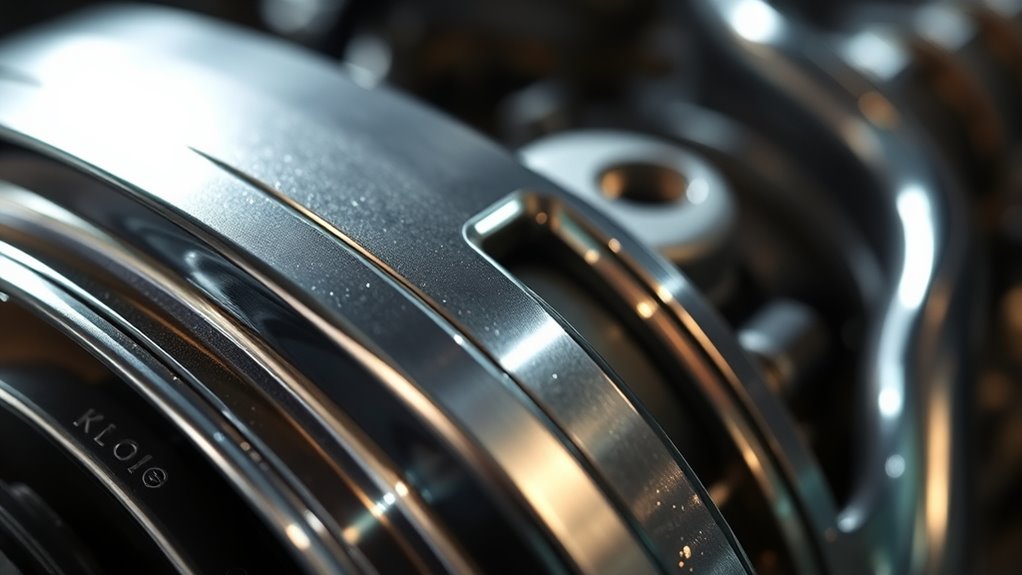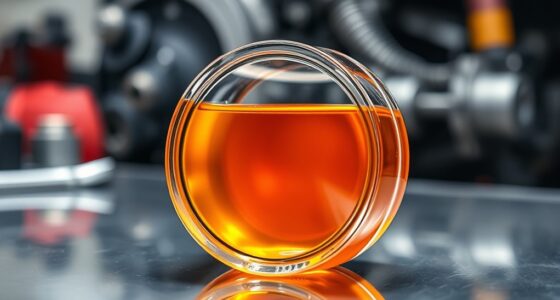Engine oil additives protect your car by forming a strong, protective film between moving parts, reducing friction, wear, and heat. They contain detergents to keep your engine clean and prevent harmful deposits that can slow performance. Additives also improve cold start operation, help seal small gaps, and contain antioxidants to stop oil from breaking down. Together, these benefits keep your engine running smoothly and last longer. If you want to discover more about their key roles, keep exploring.
Key Takeaways
- Additives form a protective oil film, reducing metal contact and minimizing wear and friction.
- They contain detergents that clean engine deposits, preventing performance issues.
- Anti-wear agents create protective layers on metal surfaces, extending engine life.
- Oxidation inhibitors and antioxidants prevent oil degradation, maintaining engine protection.
- Sealants and detergents help prevent leaks, improve cold starts, and ensure smooth engine operation.

Engine oil additives play a crucial role in enhancing your vehicle’s engine performance and longevity. When you change your oil, you’re not just topping up with any kind of lubricant—you’re also adding special substances designed to improve how well your engine runs and lasts over time. One of the key functions of these additives is to support the formation and maintenance of a strong oil film. This oil film acts as a protective barrier between moving engine parts, reducing metal-to-metal contact that can cause wear and tear. Without a proper oil film, your engine parts would grind against each other, leading to increased friction, heat, and eventual damage. Additives enhance this oil film, ensuring it’s more resilient and capable of providing consistent lubrication even under high stress or extreme temperatures.
The benefits of using engine oil additives extend beyond just forming a better oil film. They often contain detergents and cleaning agents that help break down sludge, dirt, and deposits that naturally accumulate inside your engine over time. This cleaning action keeps essential engine components free of harmful buildup, which can hinder performance and fuel efficiency. Additionally, many additives include anti-wear agents that form a protective layer on metal surfaces, reducing friction and preventing premature component wear. This means your engine can operate smoothly for longer periods, and you may even notice improved acceleration and fuel economy. Some additives also help in sealing small gaps within engine parts, which can prevent leaks and maintain ideal compression.
Another important additive benefit is their ability to improve cold start performance. When you start your vehicle in cold weather, the oil tends to thicken, making it harder for the engine to turn over and for oil to circulate properly. Additives designed for cold conditions help keep the oil flowing more easily, ensuring your engine receives proper lubrication right from the start. This reduces strain on engine parts and minimizes wear during those critical initial moments. Additionally, certain additives contain antioxidants that protect the oil from degradation caused by high temperatures and oxidation, helping the oil last longer and maintain its protective qualities. Moreover, understanding the importance of proper maintenance can significantly extend your engine’s lifespan and performance.
In essence, engine oil additives are small but powerful agents that bolster your engine’s defenses. They improve the oil film’s durability, promote cleaner operation, and reduce friction and wear. By choosing the right additives, you’re giving your engine an extra layer of protection, which translates into better performance, increased longevity, and fewer costly repairs down the road. It’s a simple step that can make a significant difference in keeping your vehicle running smoothly for miles to come.
Frequently Asked Questions
Can Additives Harm My Engine Over Time?
Additives can harm your engine if they’re incompatible with your engine’s design or if you use them excessively. Always check engine compatibility before adding anything, and follow recommended dosages. Over time, poor quality additives might break down and lose their additive longevity, potentially causing buildup or corrosion. Stick to trusted brands and consult your owner’s manual to make certain your engine stays protected without risking damage from harmful additives.
Are Synthetic Oil Additives Better Than Conventional Ones?
Think of synthetic oil additives as a race car’s turbo boost—more advanced and efficient than conventional ones. Synthetic additives boast superior additive formulation differences, offering better protection, cleaner engines, and improved performance. While conventional additives are like steady, reliable companions, synthetics often outperform them in extreme conditions. So, if you want your engine to run smoother and last longer, synthetic oil additives are the way to go.
How Often Should I Add Engine Oil Additives?
You should add engine oil additives during your regular oil change frequency, typically every 3,000 to 5,000 miles or as recommended by your vehicle’s manufacturer. Follow an additive application schedule that aligns with your oil change routine to guarantee maximum protection. Avoid overusing additives, as too much can harm your engine. Check product instructions and consult your mechanic for personalized advice, ensuring your engine stays well-protected and runs smoothly.
Do Additives Improve Fuel Efficiency Significantly?
Additives can improve fuel economy, but the benefits are usually modest. They help by reducing engine friction, keeping parts cleaner, and improving overall efficiency. However, you shouldn’t expect dramatic changes. The additive benefits vary depending on your car’s condition and the specific product. For noticeable improvements, regular maintenance and using quality oil remain the most effective ways. Additives are a helpful supplement, but not a substitute for good driving habits.
Are There Specific Additives for High-Mileage Vehicles?
Think of your high-mileage vehicle as a seasoned traveler needing extra armor. Special additive formulas are designed for high-mileage cars, helping seal leaks, reduce oil burn-off, and restore engine parts. These additives act like a protective shield, extending your vehicle’s life and maintaining performance. If you’re driving a high-mileage car, look for formulas tailored for that purpose to keep your engine running smoothly mile after mile.
Conclusion
By now, you see how engine oil additives act like medieval knights, guarding your engine from wear and tear. They clean, seal, and protect, ensuring your car runs smoothly for miles to come. Think of them as the unsung heroes in your engine’s story, much like the trusty steed in old tales. Don’t overlook their power—trust these modern-day protectors to keep your engine in top shape and avoid costly repairs down the road.









